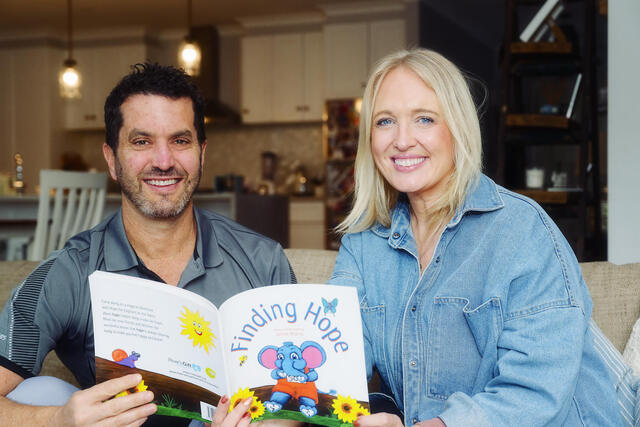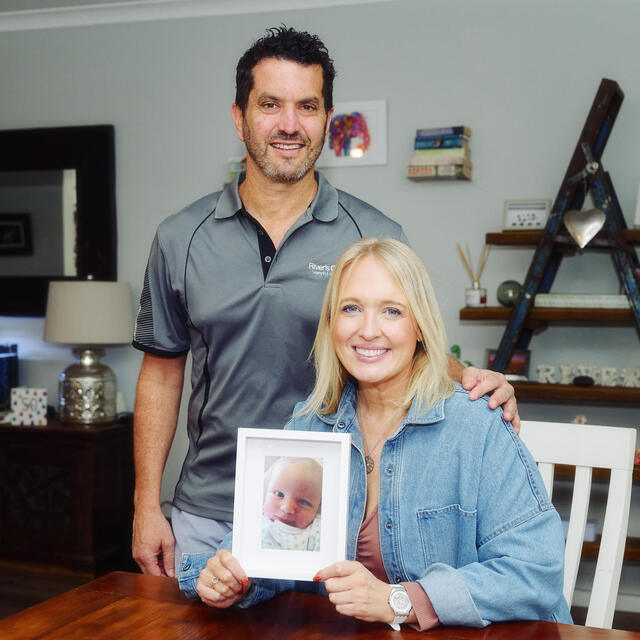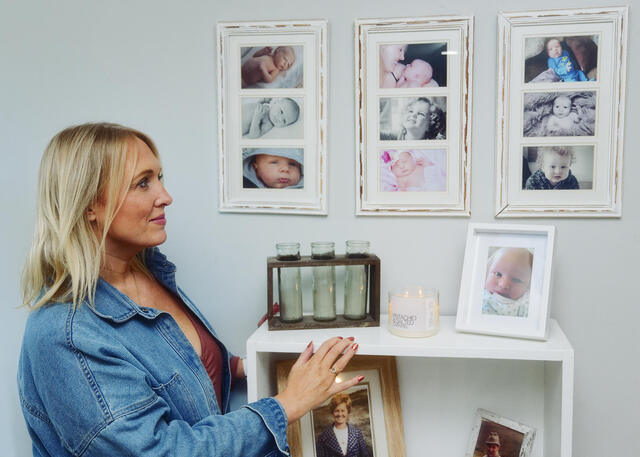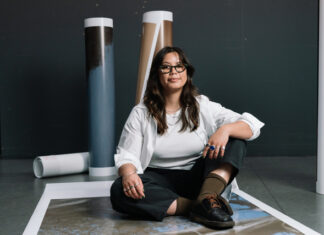After the death of their son River to Sudden Infant Death Syndrome (SIDS), Alex Hamilton and Karl Waddell founded their own charity to support SIDS education, research and advocacy. Matt Hewson sat down with them to discuss the ever-enduring grief they feel for River and the legacy they continue to build in his name.
On November 7, 2011, Alex Hamilton and Karl Waddell awoke to discover every parent’s worst nightmare.
Their baby boy River, just 128 days old, had died during the night.
“Alex’s scream from River’s room is just so deeply entrenched within me, it will never leave me,” Karl said.
“I can never erase it from my memory; Alex, running toward me with River in her arms, screaming.
“I attempted CPR… I tried everything I could. Alex was inconsolable on the front lawn when the ambos and police arrived.
“We were living in Torquay and he was a beautiful little baby, a healthy little man. He was everything.”
Forensic investigation could find no cause of death, and River’s passing was classified as a case of Sudden Infant Death Syndrome (SIDS).
From that time on, Alex and Karl have worked tirelessly to raise money through their charity organisation River’s Gift, which provides funding for SIDS research, education on safe sleeping, and advocacy and support for families that have lost their child to SIDS.
Over those 13 years, River’s Gift has grown to become a charity organisation of national and international significance, and the only one in Australia focused solely on SIDS.
But while building a charity from the ground up provided them both with purpose, direction and a reason to keep going, it was tough going in the early years.
“Alex and I were determined, we just thought, we have to do something,” Karl said.
“So what research is being funded? What’s happening? We were so driven around research, as we still are, in those first few weeks and months.
“And a community gathered around us, they were donating money to our own bank account. They knew that we weren’t going to spend it on anything but SIDS.”
In addition to trying to figure out the best way to establish River’s Gift, Alex soon fell pregnant again. She gave birth to their daughter Shiloh 11 months later, bringing joy back into their lives, but also anxiety.
“The fear of it happening again was just… for nearly 18 months we literally sat by her cot, we had a roster,” Alex said.
“When River died he was safely slept, he was on his back, we did everything we possibly could to keep him safe and it still happened. That’s really scary.
“For us, knowing that we were contributing to research that was trying to find out why, in those early days, was survival.”
By the 1990s, Red Nose Australia, then SIDS & Kids, had made a huge positive impact on the prevalence of SIDS in Australia.
Where previously more than 600 babies a year were dying unexpectedly in their sleep, Red Nose’s safe sleeping education campaign had reduced sudden infant deaths to less than 150 annually.
The Triple Risk Model explains SIDS as a combination of three factors: the critical development period of the first six to 12 months of life; the ‘vulnerable baby’ who has an undetected underlying weakness or abnormality; and exposure to an external stressor.
When all three factors occur the risk of SIDS is highest. The safe sleeping campaign helped to drastically reduce widespread exposure to external stressors, thus making SIDS very unlikely to occur in many infants.
Very unlikely, but not impossible.
“We did everything we should have done with River and he still died,” Karl said.
Early on, Alex and Karl realised that research was the key to making a difference in those cases where babies were dying in their sleep without those external stressors.
“We spoke to the researchers and they said, look, we need hands on deck,” Alex said.
“So that’s how we started. We sent early career researchers out to Harvard Medical School from Australia.
“We felt if they went to Harvard and learned from the best there, they could come back to Australia and really ignite research back here. And that’s definitely happened.
“So we’ve launched a DNA biobank at the University of South Australia. People can give their genetics, of themselves and their child that passed away, and the biobank can try to find the genetic links.”
Despite the hugely important work Alex and Karl were doing, and the arrival of their children Shiloh and Bodhi, the grief they continued to live with had taken a toll on their marriage.
In 2019 they separated, and a year later their divorce became final.
“I think (River’s death) brought us together in the initial stages, but it certainly impacted our relationship and changed us in many ways,” Alex said.
“We had two more children very quickly after, and the River’s Gift brought us together… but then you start to see the cracks, because you go in different directions.
“Karl and I separated, but because of what we’ve been through… we are really close friends; we support each other in new relationships, in co-parenting, in what life looks like now, and I think that is pretty special.”
Karl agreed, noting that the usual stresses on a marriage – the exhaustion and sleep deprivation of raising young children, finances and mortgages, working life – were compounded by their grief.
“We were very focused on all of these elements, and what we lost sight of what was us,” he said.
“So many of the conversations around the kitchen table, the conversations in the garden, were around River’s Gift. And in many ways, it was fantastic… but in terms of us as a couple, I think it definitely affected that.
“But it’s pretty special that we’ve been able to maintain that close connection and friendship, most importantly for Shiloh and Bodhi.
“They can see that Mum and Dad still love each other, but in a different way, and we love them equally and it’s all about family.”
Now in its 14th year, River’s Gift continues to expand across Australia, partnering with organisations and events to raise funds to stamp out SIDS.
The most recent connection, announced this month, is with Women in Trucking Australia (WiTA), who are partnering with River’s Gift for their upcoming TOOTS Awards dinner in Darwin in July.
Together, the two organisations are promoting the Drive Hope Across Australia campaign, which will see truckies across the country buy the River’s Gift mascot Hope the Elephant plush toys and place them on their dashboards.
“When he was born, River was gifted a little baby blue elephant soft toy,” Alex said.
“It was always something that I showed him and played with him. So when he died he was cremated with his little elephant.
“So Hope the Elephant was born out of that, and she has been such a significant part of River’s Gift.”
Hope has taken part in River’s Gift running fundraisers, inspired a song written by local children’s band the Mik Maks, and most recently been featured in a children’s book.
Hope caught the eye of WiTA chief executive Lyndal Denny, who came up with the idea of truckies taking elephant toys around Australia.
“It’s a left-field idea… (but) I think the powerful thing about it is that Hope the Elephant, by way of being on truckie dashboards across the country, is helping us get our brand right across the nation,” Karl said.
While their ultimate goal is to reduce the number of infant deaths in Australia to “as close to zero as we possibly can”, Alex and Karl are also proud to keep River’s legacy burning brightly.
“Each year on River’s anniversary we do something called Shine Blue; on November 7 we ask the community to wear our blue heart tattoo on their hands, have a blue morning tea or wear blue to work to raise funds,” Alex said.
“We’ve had the City of Greater Geelong turn their lights blue, Kardinia Park turn the (Reg Hickey stand) claws blue… and I think it was on his 10th anniversary, I remember sitting there looking up at the blue lights and thinking, oh, he would have loved this.
“Thinking that as a 10-year-old boy, he would have just gone, this is the coolest thing ever, Mum. And so I think it helps to know that we’re still parenting him in a way.”
Visit riversgift.org to find out more about River’s Gift and help raise money to stamp out SIDS.











